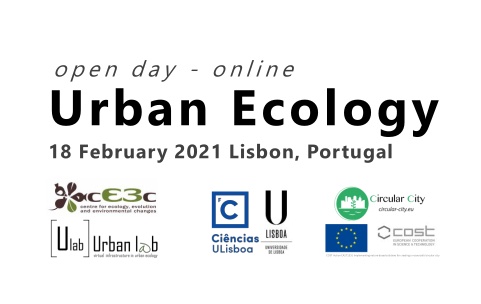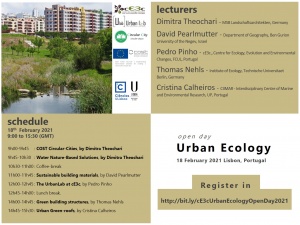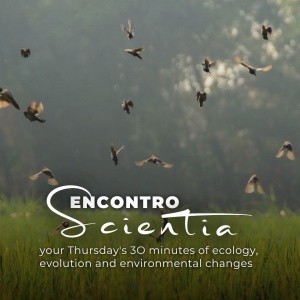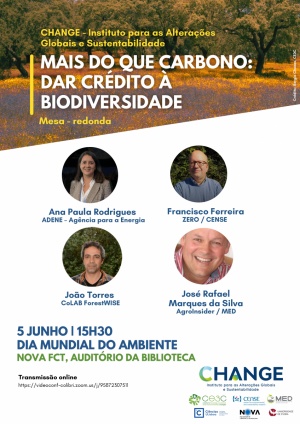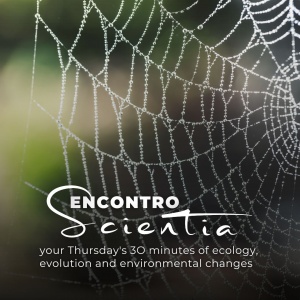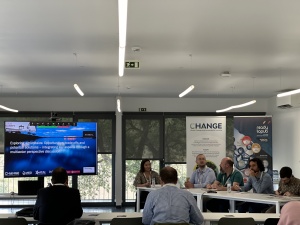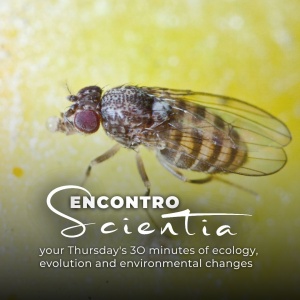12/02/2021. Text by Marta Daniela Santos.
On February 18, 2021, the Centre for Ecology, Evolution and Environmental Changes – cE3c and COST-Circular City organize an open day on Urban Ecology: a series of webinars with international experts in the field of Urban Ecology.
Via Zoom – registration required HERE.
In these webinars we will present the approaches and research being done to create more sustainable cities. We will focus on the use of nature base solutions, urban greening, and ecosystem services to tackle cities environmental problems.
Urban Ecology Open Day – SCHEDULE (GMT):
9h00-9h45: COST Circular-Cities, by Dimitra Theochari (MSB Landschaftsarchitekten, Germany)
COST Action Circular City is building a collaborative and interdisciplinary platform for connecting all stakeholders to create resilient, sustainable and healthy urban environment for our cities.
9h45-10h30: Water Nature-Based Solutions, by Dimitra Theochari (MSB Landschaftsarchitekten, Germany)
Thinking of urban infrastructure in an unconventional way give us opportunities to integrate topics of ecological and innovate Nature-based Solutions. In this talk, the focus is on water sensitive urban design and how city development can not only integrate but foster Nature-based Solutions. Different scale of projects can bring forward different kind of changes and the urban designer or landscape architect should always consider scale and adjust their targets accordingly. So, this talk promised to demonstrate different urban design solutions that demonstrate NbS on a small city plaza, a river restoration, and the Water-Sensitive Urban Design Masterplan of Copenhagen.
10h30-11h00: Coffee-break
11h00-11h45: Sustainable building materials, by David Pearlmutter (Department of Geography, Ben Gurion University of the Negev, Israel)
As an alternative to conventional building materials, whose production is a major source of CO2 emissions, we will examine the possibility of using sustainable bio-based materials - which embody circular solutions for storing, rather than emitting, atmospheric carbon.
12h00-12h45: The UrbanLab at cE3c, by Pedro Pinho (Centre for Ecology, Evolution and Environmental Changes, Faculty of Sciences of the University of Lisbon, Portugal)
The UrbanL@b is hosted by cE3c and fosters the links between research on Urban Ecology and the society. Here we will present research made on the use of nature-based solutions to tackle air pollution, the urban heat island and other environmental problems.
12h45-14h00: Lunch break.
14h00-14h45: Green building structures, by Thomas Nehls (Institute of Ecology, Technische Universitaet Berlin, Germany)
Building greening will be discussed as a systemic solution to tackle the impact of the urban heat islands and heat stress, and to improve the disturbed cycling of water. In this talk we will focus on vertical greening, such as green walls and facades.
14h45-15h30: Urban Green-roofs, by Cristina Calheiros (CIIMAR - Interdisciplinary Centre of Marine and Environmental Research, UP, Portugal)
It will be presented the green roof concept, as nature-based solution, their benefits and ecosystem services towards resilience of urban territories. It will be highlighted the challenges of green roofs implementation and their contribution to resourceful circular cities.
The Urban Ecology Open Day is an initiative organized within the cE3c / COST Circular City Advanced Course “Urban Ecology – the green within the city” that is running from February 15-19, 2021.

